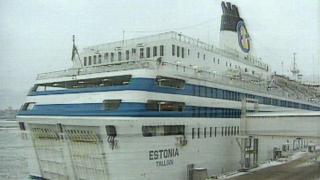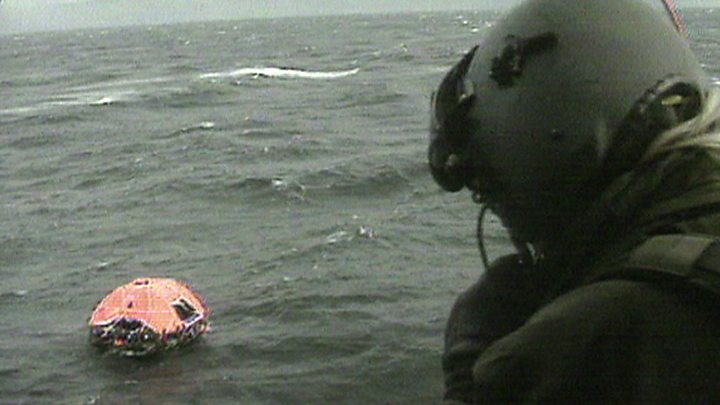
An official report said there was a problem with the Estonia ferry’s bow door locking system
A Paris court has rejected a claim for compensation over the 1994 sinking of the Estonia ferry.
More than 1,000 survivors and relatives of victims requested €40.8m (£36.6m;$45.8m) from the French agency that deemed the vessel seaworthy and the German shipbuilder.
But the court said the claimants failed to prove “intentional fault”.
The sinking of the MS Estonia killed 852 people, making it one of history’s deadliest European maritime disasters.
The vessel was sailing from Estonia to Sweden on 28 September 1994 when it sank in the Baltic Sea. Most passengers on board the ship were trapped inside after it capsized, while 97 who managed to leave the vessel died in freezing water. There were 137 survivors.
An official report into the incident in 1997 concluded that the disaster was caused by a problem with the bow door locking system.

Media playback is unsupported on your device
Survivors and relatives received compensation from the ferry’s owner for loss and damages. But the request by 1,116 plaintiffs for compensation from French certification agency Bureau Veritas and German shipbuilder Meyer Werft was denied on Friday.
The court in Paris’ western suburb of Nanterre said in a statement that the plaintiffs had failed to prove “the existence of a gross or intentional fault attributable to the firm Bureau Veritas and/or Meyer Werft.”
Image copyright
Getty Images
More than 850 people were killed when the Estonia ferry sank in September 1994
Henning Witte, a German lawyer representing relatives in the case, described the verdict as a “big disappointment” but said his clients “didn’t expect anything from the court”.
“This judgement today was little surprise. We had such bad treatment by the court over the years,” he told the BBC.
Lawyers are able to choose where they take a case involving two or more European Union countries to court, and France was chosen for the Estonia claim because it was viewed as having “the most modern law about damages”, Mr Witte said.
He said the case, which was originally filed in September 1996, took decades to be heard amid delays by the court. He was not yet sure if an appeal would be filed.
What happened to the MS Estonia?
The MS Estonia was a car and passenger ferry that was sailing from Estonia to Sweden with 989 passengers and crew when bad weather and heavy seas caused it to sink off the coast of Finland.
A crew member who survived the accident told the BBC at the time that he had seen a loading bay door open and taking in water minutes before the ship sank.
People from 17 countries lost their lives in the disaster. Of the 852 people killed, 501 were Swedish and 285 were Estonian.
The Estonia disaster is the second-deadliest peacetime sinking of a European ship after the Titanic.












